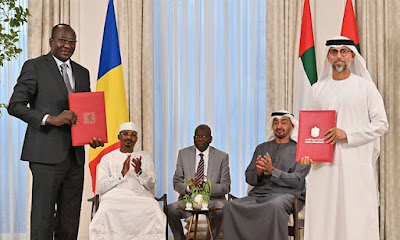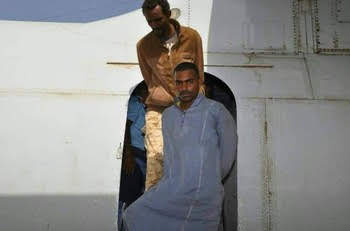NOTE from Sudan Watch editor: Sadly, here we are again… (Thanks CW!)
Is Darfur sliding back into hell?
Spate of violence in ‘ungovernable’ region stokes fears of war.
Hopes for lasting peace scatter as the region barrels towards a series of tit for tat tribal attacks – a grim echo of a not-so-distant past.
A local power struggle is ongoing in Darfur.
As the Sudanese currency tanks, the control of gold supplies has become incredibly important and many experts believe that Hemeti is the most powerful man in the country.
He is also perhaps Russia’s top ally in the region, and spent a week in Moscow at the beginning of the Ukraine invasion. Read more:
 |
Tens of thousands of people have been displaced – a grim echo of the past
CREDIT: RAMZI HAIDAR /AFP |
From: The Telegraph, UK
By WILL BROWN, AFRICA CORRESPONDENT
Published Monday 23 May 2022; 4:21pm
Is Darfur sliding back into hell? Spate of violence in ‘ungovernable’ region stokes fears of war
Hopes for lasting peace scatter as the region barrels towards a series of tit for tat tribal attacks – a grim echo of a not-so-distant past
It was the first genocide of the 21st century. A once peaceful land governed by traditional leaders split along tribal fissures and turned into a killing field the size of France. Some 300,000 people were shot, brutalised or starved to death.
After two decades of horrors in Iraq, Syria, Myanmar, Ethiopia and now Ukraine, the name Darfur has fallen out of the international consciousness – a distant memory of famished children and men on horseback with Kalashnikovs that the world would rather forget.
But last month, events in southwestern Sudan scattered hopes of a lasting peace and sent Darfur barrelling towards a series of tit for tat tribal attacks.
On April 22, the small town of Kreinik and some 16 villages around it in the West Darfur region were surrounded by hundreds of armed men. Some came on horses, others on motorbikes or in Toyotas decked out with high calibre machine guns.
The men came from the Arab Reizegat tribe. The townsfolk were mainly members of the black ethnic Massalit community. Two Arabs had been recently killed in the town and the gunmen were out for revenge.
The attackers went on a killing spree and then stormed into the Geneina, the region’s capital. The UN said more than 1,000 armed Reizegats swept into the town. According to the governor of the region, the vastly outgunned regular government forces withdrew into the local garrison.
The Reizegats pillaged the town and by the time it was all over, some 200 people had been shot or butchered including medical staff at the main hospital. Tens of thousands had been displaced, a grim echo of a not-so-distant past.
“It is destined to continue and escalate. I don’t expect the violence to subside any time soon. Darfur is ungovernable right now for any armed security force,” said Suliman Baldo, at the International Centre for Transitional Justice and a top expert on Darfur. But why now? Why is Darfur slipping backwards after years of peace negotiations and tens of billions of dollars spent on peacekeeping and humanitarian efforts?
Unresolved tribal competition
The borderland area between Sudan, South Sudan, Chad and the Central African Republic is probably the most ungoverned space on earth. Much of what’s going on is a mystery – but there are clearly several factors at play behind the spate of violence.
First, a local power struggle is ongoing. While Darfuri history and communal relations defy simplistic stereotypes, a key factor at the root of the recent spate of violence is a longstanding and unresolved tribal competition for access to resources, according to Mr Baldo.
Darfur is not the endless barren desert portrayed in glossy NGO brochures pleading for funding. Parts of the region are incredibly wealthy with good pasture, arable land and vast quantities of gold.
As Sudan’s tattered economy struggles with global shocks of the pandemic, war in Ukraine and a regional drought, competition over these scarce resources is increasing.
“This is strongly reminiscent of the conflict we’ve seen in Darfur before running along tribal and racial fissures,” said Jonas Horner, an independent expert on Sudan. “The root causes of those conflicts were never addressed.”
Events some 700 miles away in the Sudanese capital are also playing a major role.
For much of the last century, Darfur has been a periphery area that elites in the bustling metropole Khartoum have tried to dominate for resources. The current situation in Khartoum is tense and experts say power struggles are spilling out into the periphery.
Sudan’s old Islamist dictator, Omar al-Bashir – who once played different Darfuri groups against each other and terrorised Darfur with bands of Arab janjaweed militiamen – was swept away in a revolution in 2019 after almost four decades in power.
A liberal former UN-staffer, Prime Minister Abdalla Hamdok, was charged with guiding Sudan along the road to full democracy as part of a complex transitional government. But he was ousted in a coup in October 2021.
Now two major groups are tussling for control. On one hand, is the Sudanese Armed Force (SAF), headed up by General Abdel Fattah al-Burhan – who is now the de-facto head of state and in many ways represents the old interests of the old centralised elites.
On the other hand there is Hemeti, a Darfuri warlord from the same Arab Reizegat tribe who carried out last month’s massacre. Hemeti heads up a well-armed militia movement called the Rapid Support Forces (RSF), which was formed out of the old janjaweed raiders and controls some of Darfur’s major gold mining areas.
Locked in a simmering struggle
As the Sudanese currency tanks, the control of gold supplies has become incredibly important and many experts believe that Hemeti is the most powerful man in the country. He is also perhaps Russia’s top ally in the region, and spent a week in Moscow at the beginning of the Ukraine invasion.
Both the SAF and RSF are locked in a simmering struggle which keeps coming perilously close to outright conflict. There are multiple eyewitnesses and media reports indicating that uniformed RSF soldiers supported the Rizeigat Arabs when they attacked the Massalit last month.
Even though the SAF forces have a duty to protect Sudanese civilians, they did not want to confront the RSF in Darfur – most probably because it could have escalated into an even larger fight.
Mr Baldo said the recent attacks shows just how incompetent and ethnicised Sudan’s security forces are, and how little control the Sudanese state has in rural areas.
“The massacre is an indictment of the military-led government in Khartoum, in place since the October 25, 2021 coup. When the military seized power their claim was that they – as security forces – needed to step in to provide security,” Mr Horner said.
“Recent evidence in Darfur and elsewhere sees them failing completely in their most fundamental task,” he added.
Russian mercenaries could also be a factor in the recent spate of violence. Mercenaries working for the Wagner group are involved in diamond and gold mining in the Central Africa Republic and have been accused of carrying out massacres close to the Sudanese border.
This could be feeding into local power dynamics in the Darfur area, upsetting a complex web of local interests in ways which are not fully understood.
Another factor is Chad. The country’s former dictator Idriss Déby used to be the West’s go-to strong man in Central Africa. Mr Deby’s well-trained desert army helped keep a lid on many of the nastiest groups in the region for years, guaranteeing his dictatorial regime strong Western support.
But since Mr Déby was killed last year, allegedly while fighting with his troops on the frontline, his son Mahamat Idriss Déby has struggled to fill his father's shoes. The Chadian security forces are struggling to exert the same amount of influence in Chad’s borderland areas.
This could, Mr Horner says, be giving oxygen to some of the more violent groups in Darfur.
PHOTO AND CAPTION: Darfur has fallen out of the international consciousness – a distant memory that the world would rather forget CREDIT: Zohra Bensemra/Reuters
PHOTO AND CAPTION: A child refugee from the Darfur region of Sudan pictured at a refugee camp in Chad in 2004 CREDIT: Scott Nelson/Getty Images
PHOTO AND CAPTION: A local power struggle is ongoing in Dafur CREDIT: MARCO LONGARI,/AFP
PHOTO AND CAPTION: Supporters of Sudan's former President Omar Hassan al-Bashir protest in Khartoum in 2008 CREDIT: MOHAMED NURELDIN ABDALLAH /REUTERS
View the original here: https://www.telegraph.co.uk/global-health/terror-and-security/darfur-sliding-back-spate-violence-ungovernable-region-stokes/


.jpeg)




